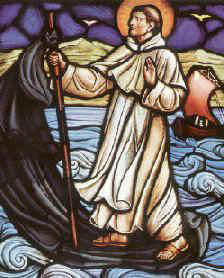|
To work for the proper implementation of canon law is to play an extraordinarily constructive role in continuing the redemptive mission of Christ. Pope John Paul II |
|
|
|
|
Resolution 1152 x 864 |
Updated 10 jan 2013 |
Film Review of "Shadowlands" (1993), with Anthony Hopkins, Debra Winger |
|
Edward Peters, Film review of "Shadowlands", in Southern Cross (10 Feb 1994) 34.
C. S. Lewis died on the same day as John F. Kennedy, Nov 22, 1963. |
Although C. S. Lewis was one of this century’s greatest men of religious letters, “Shadowlands” is not a religious movie. It’s a love story, and it's excellent.
Lewis
was the premier
Anglo-Catholic philosopher in post
war England.
Through his popular lectures and even more popular books,
Lewis addressed a wide
array of issues, including the theme of
"Shadowlands", pain and suffering in
a world created by a loving God. Lewis often
described pain as the "megaphone by which God breaks through our deafness,"
or as the "sculptor's blows which,
though they hurt so much, make
us perfect." His confidence in his
conclusions instilled confidence in his
listeners, but
was his
confidence tested?
If pain
is a megaphone,
one senses that from the time American-born
Joy Gresham first identified Lewis by shouting out
his name
in a sedate English tearoom, her love was going to bring pain into his. life:
Fortunately, through many years of study and prayer, Lewis had developed the
strength which he himself would need when he married Joy, but then lost her to
cancer.
As history,
"Shadowlands" is broadly accurate. Friends who know Lewis' life better
than I note that Joy had two children, not one, when she met Lewis, and that the
events portrayed in "Shadowlands" stretched out over 10 years, not one
or two. They also confirm what a viewer might already suspect: Lewis' own mother
did die during his youth, but the parallel between his loss and that of Joy's
younger son is overdone.
Moreover, whenever a Christian story, even a love story, is put on film, the
limitations of its secular audience inexorably mute some of the spiritual
content of the story. It's been that way since Robert Bolt's "A Man for All
Seasons," and it isn't likely to change soon. Thus, for example, Joy's
status as the divorced third (not second) wife of her American "ex"
was more of an obstacle for Lewis than "Shadowlands" let's on. Still,
these points do not distract.
Although one might wish that the conclusion of "Shadowlands" had been
made a bit clearer (remember the risk of subtle points being lost on a
modern audience) the fact is that, in the end, Lewis' love for God was proven through
his and Joy's sufferings. Confidence in God,
it seems, also instills strength in man.
The more one brings to a film, the more one can take away from it, and "Shadowlands" is especially amenable to supplemental reading. Prior to seeing it, try to read Lewis' children's masterpiece The Lion, The Witch, and the Wardrobe. It will help explain the attic scenes. Lewis' The Problem of Pain is better read before seeing "Shadowlands," but the plot might unfold better if one reads his Surprised by Joy and A Grief Observed afterward. Don't let these little suggestions, though, get in the way of just enjoying, and learning from, this fine film.
|




